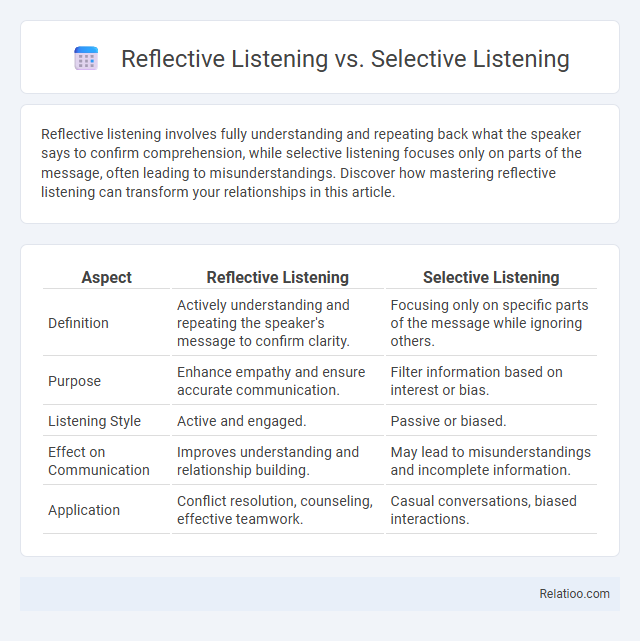Reflective listening involves fully understanding and repeating back what the speaker says to confirm comprehension, while selective listening focuses only on parts of the message, often leading to misunderstandings. Discover how mastering reflective listening can transform your relationships in this article.
Table of Comparison
| Aspect | Reflective Listening | Selective Listening |
|---|---|---|
| Definition | Actively understanding and repeating the speaker's message to confirm clarity. | Focusing only on specific parts of the message while ignoring others. |
| Purpose | Enhance empathy and ensure accurate communication. | Filter information based on interest or bias. |
| Listening Style | Active and engaged. | Passive or biased. |
| Effect on Communication | Improves understanding and relationship building. | May lead to misunderstandings and incomplete information. |
| Application | Conflict resolution, counseling, effective teamwork. | Casual conversations, biased interactions. |
Introduction to Reflective and Selective Listening
Reflective listening involves actively understanding and mirroring the speaker's message to confirm comprehension, enhancing communication accuracy and empathy. Selective listening, by contrast, focuses on hearing only specific parts of a conversation, often filtering out information deemed irrelevant, which can lead to misinterpretation. Both techniques serve different communication purposes, with reflective listening fostering connection and selective listening prioritizing information filtering.
Defining Reflective Listening
Reflective listening is a communication technique where the listener actively paraphrases or mirrors the speaker's message to confirm understanding and demonstrate empathy. Unlike selective listening, which involves focusing only on specific parts of the conversation, reflective listening requires full attention to capture emotional and contextual nuances. Effective reflective listening enhances interpersonal connections by validating the speaker's feelings and encouraging open dialogue.
Understanding Selective Listening
Reflective listening involves actively paraphrasing or summarizing what the speaker says to confirm understanding, enhancing clarity and empathy. Selective listening, however, means focusing only on specific parts of the conversation that interest you, which can lead to misunderstandings or missed information. To improve your communication skills, understanding selective listening helps you recognize when you filter out important details and encourages more mindful, comprehensive listening.
Key Differences Between Reflective and Selective Listening
Reflective listening involves actively understanding and mirroring the speaker's message to ensure clarity and empathy, whereas selective listening filters and focuses only on specific parts of the conversation based on personal interest or bias. Reflective listening promotes deeper engagement and connection by validating the speaker's emotions, while selective listening often leads to misunderstandings and incomplete information processing. Key differences lie in intent and outcome: reflective listening seeks comprehension and rapport, whereas selective listening prioritizes convenience and partial attention.
Psychological Impact of Reflective Listening
Reflective listening involves actively mirroring the speaker's emotions and content, fostering deeper understanding and trust, which can significantly reduce anxiety and enhance emotional connection. Selective listening, by contrast, filters information based on personal biases, often causing miscommunication and feelings of neglect. Your psychological well-being benefits most from reflective listening as it promotes validation and empathy, creating a supportive environment for open communication.
Effects of Selective Listening on Communication
Selective listening often leads to misunderstandings and diminished trust in communication because You only hear parts of the message that align with your views, ignoring vital information. This behavior can cause fragmented conversations, reduce empathy, and increase conflicts in personal and professional relationships. Effective communication improves when selective listening is replaced with reflective listening, which ensures full understanding and validation of the speaker's intent.
Benefits of Practicing Reflective Listening
Reflective listening enhances communication by promoting understanding and empathy, reducing conflicts, and improving relationships in both personal and professional settings. Unlike selective listening, which filters information based on personal bias, reflective listening ensures the full message is acknowledged and validated, leading to clearer and more accurate exchanges. Practicing reflective listening cultivates active engagement, fosters trust, and aids in problem-solving by encouraging open dialogue and mutual respect.
Common Pitfalls of Selective Listening
Selective listening often leads to missing critical information because you focus only on parts of the conversation that interest you, ignoring other essential details. This habit can create misunderstandings and compromise effective communication, especially in professional settings. Your ability to practice reflective listening, which involves fully concentrating and responding thoughtfully, helps avoid these common pitfalls by ensuring you accurately process the speaker's entire message.
Strategies to Develop Reflective Listening Skills
Reflective listening involves actively understanding and mirroring your conversation partner's message and emotions, which enhances empathy and trust. To develop reflective listening skills, focus on strategies such as maintaining eye contact, paraphrasing what is said, and asking clarifying questions to confirm understanding. Practicing mindfulness and reducing internal distractions improves your ability to fully engage with and respond thoughtfully to the speaker's intentions.
Choosing the Right Listening Approach for Effective Communication
Choosing the right listening approach is crucial for effective communication, with reflective listening enabling you to actively confirm understanding by paraphrasing and validating the speaker's message. Selective listening focuses your attention on specific information relevant to your needs, filtering out extraneous details to enhance efficiency. Your ability to balance these with general listening skills ensures clear comprehension, better response accuracy, and stronger interpersonal connections.

Infographic: Reflective Listening vs Selective Listening
 relatioo.com
relatioo.com